What follows is a compilation of fragments written or thought about as we wend our way through early spring. Too short and disjointed as individual posts, the final compilation proved too unwieldy. In the spirit of compromise – one post in three parts.
The photos are from an evening walk mid-May when everywhere glowed pink as the light faded. Pink – the colour of compassion and understanding.
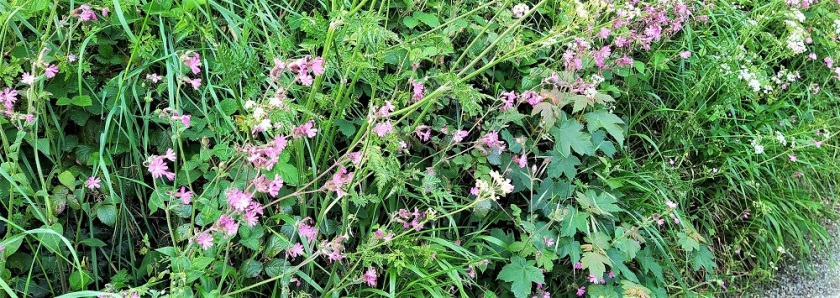
It came as no surprise to learn that in the UK, May 2020 has been the sunniest and driest for over a century. May is one of my most favourite months. I began, mid-month, waxing lyrical to myself on the glories of the wildflowers and the Cornish spring – for surely this has been the earliest spring and the most marvellous year for the flowers? Then I noticed drafts of posts from past years, some published, some not, but all centred around the wonderful month of May and how this year or that year has brought forth one of the finest Mays I’ve seen. It gave me pause for thought. Is there really a need for yet another paean to this most beautiful moment in our calendar?
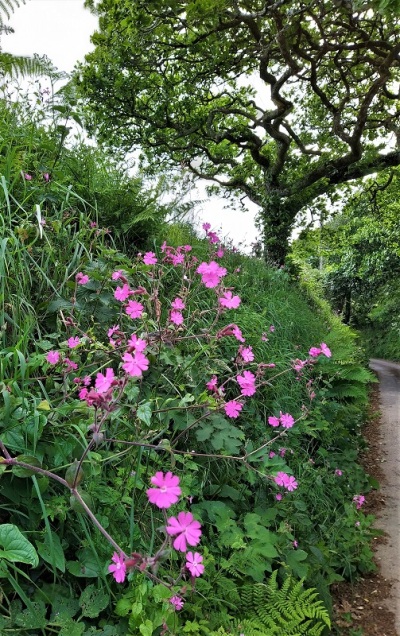
But there is a difference this year. The end of May marked the end of the second full month of lockdown. It’s bittersweet that this has been the most glorious spring. I’m very mindful of how fortunate I am to be able to immerse myself in it from the safety of my immediate neighbourhood. I’m equally mindful of its unique status: this has been a spring like no other but not because the sun has been shining. This is a time that demands to be recorded for darker reasons.
In late March and into April when first I ventured away from the house and into the lanes, feeling almost obligated to make use of my daily exercise quota given my privileged position, it seemed like there were no people left in the world.
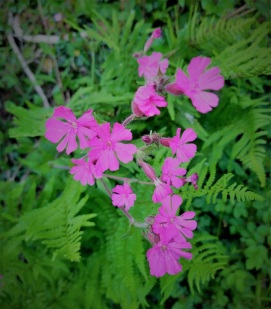
This sounds fanciful and overly dramatic but – isolated as we are at the best of times – seeing the empty towns and cities on our tv screen was jarring and surreal.
I walked.
I found the silence disturbing.
There was still birdsong; the wind still whispered in the trees. Cows called and an occasional tractor motored in a field. But knowledge of the profound changes elsewhere had seeped rapidly into my bloodstream. I wandered the lanes against a backdrop of nature’s rhythmic melody, acutely conscious that there were at the same time no outdoor places anywhere in the country which were bustling with human life. It was an eerie and unsettling experience.
But I walked. Tentatively. And as the days passed I began – tentatively – to read again too, and one of the first things I finished was a rendition in poetry by Matthew Francis of The Mabigoni – the first four branches of the Welsh Mabinogion. Matthew Francis was new to me: a Welsh alchemist able to paint pictures with words which had me enthralled even in the turmoil of a pandemic.
There was a standout section which made my heart race, not because it’s the best imagery or the best constructed stanza in the poem but because it reminded me powerfully of the universality of human experience. This is surely the role of the poet: to speak directly to the heart of the individual? The Mabigoni are mythic tales. Centuries old, from a country rich in oral tradition, steeped in magic; they require suspension of disbelief. Epochs apart from a world in the grips of a pandemic. And yet…
In the third branch of the Mabigoni (at least as Francis has re-imagined it) the entire land vanishes – a fog descends and when it clears, all the people of the land and all traces of their presence have been magicked away. Just the four people in the tale are left. And when I read that section my heart constricted and then pounded with the jolt of recognition.
…there is only you, as you have always known, and when a thinness insinuates, when space and colour leak back, the brightness is a sham.
… All that we laid on the land – the long grasses we sowed for the goodness in the seeds, the animals that chewed the countryside into tameness, the dwellings of wood and stone – the fog has lifted.*
… Only these four are left, and their four horses. They ride back through unhedged acres in an unfamiliar dusk without smoke or lights. The hall’s still there, a hulk, black on grey, bigger than they remembered. How did they live here in this quarry of footsteps, this towering night?
*taken
This is how I felt when lockdown hit. How do I live here when the world is so much changed? How can I look upon things that are unchanged when everything has changed?
Those words – Francis’ words – the retelling of a tale centuries old, echoed my experience of walking in a world where once people were free to wander as they wished but now were spirited away behind closed doors. I’ve quoted them here without the correct formatting for which I hope Mr Francis will forgive me. They embody for me that visceral sense of loss and bewilderment. Where have all the people gone? I am left with the compassionate silence of the flowers, luminous as twilight falls.
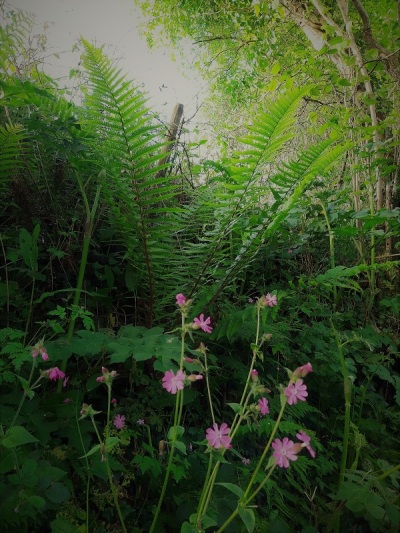
…it is the poet’s job to communicate ‘the mysterious’, by means of the feelings and emotions his or her words arouse in the reader.
(Robin Waterfield in his introduction to my copy of The Prophet by Kahil Gibran
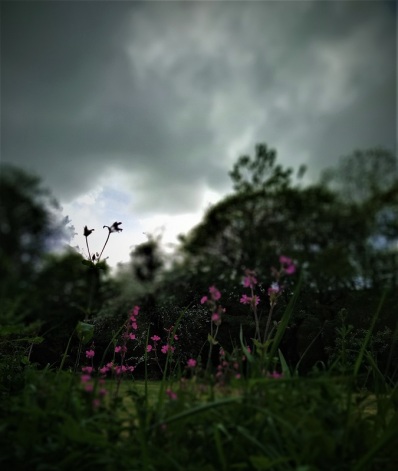




Yes, that touches so much for me , too ,Sandra. We have been fortunate here to be able to appreciate the unchanged in a world where everything has changed. We have loved the peace and silence, but have questioned the cost. We have been bewildered too and tried to come to terms with the opposing, unknown difficulties faced every day at all levels .
I love the Mabigonion- I don’t pretend to understand it all, but , like you,at times I have found lines which speak to me from a deep atavistic past- something shared by humanity , touched upon and maybe forgotten and drowned by modern life. And yes, May is pink- and blue too , in our garden.xxx
LikeLiked by 1 person
I’m happy that you understood what I was trying to convey, Pat. Perhaps you of all people, would 😊
It’s taking me a while to get to grips with the Mabigonion but the more of it I experience, the more I love it. x
LikeLike
I don’t think I will ever get to grips with it Sandra, but, as with a lot of the written word, it occasionally and unexpectedly reaches out and finds the intended open target within.xxx
LikeLiked by 1 person
You summed up the connection in a single word: atavistic xx
LikeLike
I keep reading news reports of how strange life became in big cities like New York during the pandemic. I haven’t ventured forth enough yet myself and probably won’t do so until after everyone else has also re-emerged. For this reason I especially appreciate your thoughtful wanderings.
LikeLiked by 1 person
Thanks Mary. Wandering where I am is almost all people-free. I have not walked in any of our local towns and villages let alone cities but what I have seen feels very alien. I shall have to get used to it though; I think it may be a while before life regains any sense of its own patterns.
LikeLiked by 1 person
Enjoyed reading about your connection to the Francis poem and I think you’ve articulated what we’ve all felt so well.
LikeLiked by 1 person
Thank you 🙂
LikeLiked by 1 person
I think it’s great to write down your reflections during this very unusual time, which will – hopefully – be a once in a lifetime event. I had similar feeling when I first ventured out in central London during the lockdown: It was like a dystopian novel, where everyone but me had disappeared to another dimension. Beautiful photos, it really is ironic, that we have had the most wonderful weather during a lockdown.
LikeLiked by 1 person
Dystopian is the word for it, Stargazer – even down here in rural isolation. It must have been so much more so in London. I have adjusted now to how it is here and we’re seeing noticeably more cars anyway now. But it’s going to be some time before life gets anywhere close to normal I think.
LikeLiked by 1 person
What a beautiful meditative piece, Sandra!
LikeLiked by 1 person
Thank you, Laurie 😊
LikeLiked by 1 person
lovely piece and lovely photos. thanks as it cheered me up no end.
LikeLiked by 1 person
Thank you so much, Penelope. And thank you for following 😊
LikeLike
I smiled when I realised that every May in England is loveliest ever.
The pink flowers against those green, green backgrounds are beautiful. I appreciate the photos that accompany your words as I couldn’t imagine how beautiful the countryside is otherwise.
I’m finding my local walks to be unsettling too, but am grateful for your post which reminds me that we feel the same all around the world.
LikeLiked by 1 person
I am finding that I really need that sense of worldwide connection, Rose: that whatever our individual experiences of this pandemic, we do all connect on an emotional level.
LikeLiked by 1 person
I loved this thoughtful piece, Sandra. And you’ve encouraged me to seek out the Mabigonion, which I don’t know. And to hunt out Matthew Francis’ contribution to the Hay Festival – I took out a digital subscription so I could continue to explore their past offerings. Thank you!
LikeLiked by 1 person
Thanks, Margaret. Part two will hopefully follow soonish. Despite having loved this year’s Hay Digital and having a subscription, it hadn’t occurred to me to look for Matthew Francis at Hay and yes – there his is from past years! And reading from this book I believe! Fantastic – I shall enjoy it enormously. I’m so pleased you pointed it out, thank you!
LikeLiked by 1 person
Lovely post, Sandra – thoughtful as always. Yes, it’s a funny old world at the moment. I haven’t been out much but the emptiness is partly very alluring and partly discombobulating. My hermit soul thinks it can live without much direct human contact, but it’s odd how much I’ve missed the casual chat over the fence with neighbours or the passing conversations in the high street…
LikeLiked by 1 person
I too have a hermit soul, FF. (Which amuses me greatly when I think of our cheery blog chats online. Anyone reading them would think we relished being with people! Which we do of course, but on our own terms… 😂 ) For me the emptiness has definitely been discombobulating. And seeing people in socially distanced queues or wearing face coverings (from the safety of my car) has been equally upsetting. It’s going to take me a long time to adjust to post-covid life when it comes to rejoining civilisation… 😟
LikeLiked by 1 person
A truly beautiful post, Sandra. It will stand alone when looking back from future May paeans.
LikeLiked by 1 person
Thank you, Derrick. This May will indeed stand alone. As will much of this year, I fear. But on we goas on we must! 😊
LikeLiked by 1 person
Absolutely perfect. We try to make sense of the world through nature and stories, the cycle of growth and death. Is illumination possible? I hope so.
LikeLiked by 1 person
I don’t know how possible it is, Laurie, but turning to stories and nature certainly helps. And as a species we have doing it for centuries 🙂
LikeLiked by 1 person
I’ve just listened to Matthew Francis – so glad to have had this introduction – thanks, I hadn’t come across him before. Another book for the list!
LikeLiked by 1 person
One of the wonderful things about Spring is that it takes me by surprise every year, and every year I think, like you, it must be more spectacular than last! Thank you for the introduction to Matthew Francis and for your beautiful photographs, the bright green fern and (is it?) ragged robin is particularly gorgeous.
LikeLiked by 1 person
I think we are always so eager to see spring after a grey damp winter that we grasp on to every lovely day and amplify them into a long sequence of sunshine and brightness! Although this year we really did have a long sequence of just that!
As for the flower – I think it’s red campion, Jane. They are very similar in colour but ragged robin has more delicate petals – more ragged I suppose! WE have both but it’s the campion which is taller that really grabbed the attention on that particular walk 😊
LikeLike
You remind me how much nature has impacted us in this time of lockdown (lovely photos, by the way) and how centuries-old tales can still speak to us. I really want to reread that Third Branch now in the various translations I have and think of its continued relevance. Thank you.
LikeLiked by 1 person
I have found Matthew Francis’ rendition so helpful in allowing me to grasp the storyline alongside some wonderful wordplay. I have a tentative foundation now and will read further. Do let me know if you find time to re-read the third branch and feel the same relevance as I did!
LikeLike
Will do, Sandra. It’s quite short so I’m sure I can find time to slip it into my busy reading ‘schedule’ (!). Thanks so much for the reminder.
LikeLiked by 1 person
“I am left with the compassionate silence of the flowers, luminous as twilight falls.” Love this line so much, Sandra. I am super interested in checking out that book, too. Thank you for this thoughtful, beautiful piece. I will be looking for part 2.
LikeLiked by 1 person
Thanks you, Amy, I’m happy that you enjoyed it 😊
LikeLiked by 1 person
We live near other people and while I haven’t been able to sit down with any of them, I enjoy hearing the kids playing when I open the windows. Even people yelling at each other reassures me that I am not alone! I am afraid that here at least we will not return to any pre virus life. No one knows what the new normal will look like and too many are trying to pretend that the virus has gone. The infections are going up across the U.S. as a result of that denial.
LikeLiked by 1 person
Yes, I have read of where the numbers are rising in certain states. We may yet see something similar here. Like you, I fear that there may not be a return to life as it was, especially for the older sectors of the population. I am taking each day as it comes and relishing the good wherever I find it.
LikeLiked by 1 person
I am glad to be a contemplative at heart already!
LikeLiked by 1 person
The sense of an eerie, quiet beauty comes across very strongly Sandra, it must have been strange indeed. In some ways it felt the opposite here – when I went to the park or walked down to the river there seemed to be more people around than usual – all, presumably doing their daily exercise or sitting outside their houses in the sun when they would usually be at work….
LikeLiked by 1 person
We all have such different experiences of this period, Andrea, generated by age, location, ethnicity, occupation, gender, income…. I consider myself to be very fortunate.
LikeLiked by 1 person
Your photos are exquisite. Reading your words it struck me that there can be such a fine line between celebration and lament. I think you have captured that precarious quality to life, which we used to be able to deny more easily.
Here in South Africa, our number of infections is escalating more rapidly and it is hard not to be sad and afraid. But we have to fend off our fears and acknowledge the sadness, draw on reserves of courage and carry on.
LikeLiked by 1 person
Carol, knowing the quality of your photography I am very touched by the compliment, thank you. I see the numbers rising in South Africa; you are some weeks behind us here and of course, the social and economic conditions there are very different. It is a huge challenge for Africa. I feel for you all.
I have always considered celebration and lament as two sides of the same coin and at this time both are occurring constantly. The sorrow is manifest throughout the world; perhaps in part why I feel the need to celebrate small joys and acknowledge my gratitude. Perhaps also, a way of bolstering my own courage. To be pulled down by fear and sorrow is counter-productive.
I’ve been thinking a lot about the purpose of blogging which you raised in your own recent post, and resolving my own conflict about it. These are unprecedented times and – as you say in your comment – what we once might have taken for granted is no longer assured. But we will, each in our own way, carry on and do what we can. Stay safe, Carol 🙏
LikeLiked by 1 person
You are right that we need to bolster our own courage, and in doing that we are better able to support each other too. It is helpful to see celebration and lament as two sides of the same coin and gratitude can be a powerful force.
My thoughts have been interrupted by a stray passage from a song by the Pretenders ‘Hymn to Her’ (from the 1980s) – as I recall the lyrics go: She will always carry on. Something is lost. Something is found.
It seems to echo aspects of what we are touching on.
So you too Sandra, keep strong and carry on and you stay safe too. Thank you.
LikeLiked by 1 person
I finally read your post. I have noticed in my readings since March 13th (when I made the decision to stay home ahead of my nation’s shut down) that everything I read is enhanced by the quarantine experience. I think of this as an unique time and yet every author describes feelings akin to what I am feeling.
I don’t always know what the next book I plan to read is about. I read a Jack London writing called the Scarlet Plague and then recently read a book about racial unrest and protests. In my little city of Louisville, we had a terrible event where our police showed up at a darkened home of a couple at 1 AM. They didn’t knock or identify themselves as law enforcement nor were any of the officers wearing uniforms or body cameras. The couple on the inside of the home thought someone was breaking in and the man got his gun to defend his home. His lady, Breonna Taylor, was shot 8 times. She had been a health care worker. It was initially reported as a “drug bust gone bad.” There have been continuous protest demonstrations since the day the truth of this terrible event became known. My 22 year old grandson has joined the peaceful protests and was shot with rubber bullets on one occasion. He still returns to the protest gatherings. The book I had chosen to read echoed much of what was/is happening near my neighborhood. I wonder if any experience is truly unique…or do we just believe that what is a new event to us is unique to the world?
LikeLiked by 1 person
Deb, that is truly terrible. I hadn’t realised this was happening in your town. We are living in dark times. I have your email here and will reply properly very soon x
LikeLike